One Europe, one European Union, one euro area. And what about the other 10?
Ralitsa Kovacheva, February 7, 2011
 For the first time the covering the European Council made me feel the existence of parallel worlds. Because, while EU leaders were announcing with smiling faces the triumph of the European spirit, the Union had been divided just before my eyes. Europe of the eurozone and of the rest, Europe of the member states and of the European institutions.
For the first time the covering the European Council made me feel the existence of parallel worlds. Because, while EU leaders were announcing with smiling faces the triumph of the European spirit, the Union had been divided just before my eyes. Europe of the eurozone and of the rest, Europe of the member states and of the European institutions.
As you know, the dominant topic before the Council was the Franco-German proposal for a so-called Pact for Competitiveness, which to be agreed by the eurozone countries. It was expected that this issue would largely shift attention from the official themes of the Council - energy and innovation.
In response to these expectations, German Chancellor Angela Merkel and French 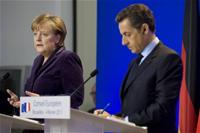 President Nicolas Sarkozy gave a briefing to explain what they would present to their colleagues over the official lunch. Namely: A Pact for Competitiveness, which will be mandatory for the euro area countries, but will be open to other countries wishing to join. Without entering into details, Mr Sarkozy and Ms Merkel explained that it was about more convergence of policies of the euro area countries ant to that end, France and Germany had developed “a structural plan designed to respond to the challenges that Europe faces.”
President Nicolas Sarkozy gave a briefing to explain what they would present to their colleagues over the official lunch. Namely: A Pact for Competitiveness, which will be mandatory for the euro area countries, but will be open to other countries wishing to join. Without entering into details, Mr Sarkozy and Ms Merkel explained that it was about more convergence of policies of the euro area countries ant to that end, France and Germany had developed “a structural plan designed to respond to the challenges that Europe faces.”
“We are working hand in glove, by “we” I mean France and Germany, with a clear, total determination to support the euro, to defend the euro. We consider to be a major factor in building Europe. We want to strengthen competitiveness of Europe’s economy, we want to ensure the convergence of different European economies”, Mr Sarkozy said.
The deadline, set by Paris and Berlin, is by the European Council on 24 and 25 of March when a concrete proposal has to be agreed by the eurozone countries. This will happen during a special euro area Summit in early March. Later, Angela Merkel explained that the exact date would depend on the elections in Ireland, in order the new government to be formed so as to participate in the meeting.
Ant to exclude any doubt, a statement of the leaders of the euro area countries is attached to the Council's conclusions saying:
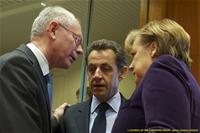 “Building on the new economic governance framework, Heads of State or government will take further steps to achieve a new quality of economic policy coordination in the euro area to improve competitiveness, thereby leading to a higher degree of convergence, without undermining the single market. Non-euro members will be invited to participate in the coordination. The President of the European Council will undertake consultations with the Heads of State or government of the euro area Member States and report back, identifying concrete ways forward in line with the Treaty. To this effect, he will closely cooperate with the President of the Commission. He will ensure that the Heads of State or government of the interested non-euro area Member States are duly involved in the process.”
“Building on the new economic governance framework, Heads of State or government will take further steps to achieve a new quality of economic policy coordination in the euro area to improve competitiveness, thereby leading to a higher degree of convergence, without undermining the single market. Non-euro members will be invited to participate in the coordination. The President of the European Council will undertake consultations with the Heads of State or government of the euro area Member States and report back, identifying concrete ways forward in line with the Treaty. To this effect, he will closely cooperate with the President of the Commission. He will ensure that the Heads of State or government of the interested non-euro area Member States are duly involved in the process.”
Namely in this paragraph the thin red line of division in the EU is passing through, for 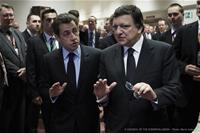 which we can say now that it is a fact. The division runs in two fronts. On the one hand - the euro area and the others. And on the other - the euro area member states and the EU institutions. Because, obviously, as far as the Commission President will ever be involved in the process, it will be concerning non-euro area Member States who would be interested to join the Pact.
which we can say now that it is a fact. The division runs in two fronts. On the one hand - the euro area and the others. And on the other - the euro area member states and the EU institutions. Because, obviously, as far as the Commission President will ever be involved in the process, it will be concerning non-euro area Member States who would be interested to join the Pact.
In plain text this paragraph says: “The problems of the euro area are the euro area governments' business”. Here is the explanation of Angela Merkel, hardly needing any comment: “We are not intending to transfer power to the European Union. It is about coordination amongst the individual governments, you will have to ask the national parliaments. Of course, the European Parliament will be informed about this but as I said this is cooperation at the level of the governments of the euro members as an intergovernmental cooperation, without transfer of power.”
Against this background the press conference of the President of the European 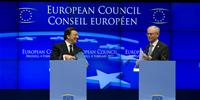 Council, Herman Van Rompuy and Commission President José Manuel Barroso looked like a collision with a parallel reality. Despite the persistent questions of journalists, Mr Van Rompuy almost swore that no concrete proposals were discussed. And the European Commission President, Jose Manuel Barroso, said that no powers had been taken away from the EU or its institutions, on the contrary - there would be an increased coordination in areas which were previously a prerogative of national governments. But as it became clear, they would remain a prerogative of national governments, but would also be subjected to intergovernmental coordination.
Council, Herman Van Rompuy and Commission President José Manuel Barroso looked like a collision with a parallel reality. Despite the persistent questions of journalists, Mr Van Rompuy almost swore that no concrete proposals were discussed. And the European Commission President, Jose Manuel Barroso, said that no powers had been taken away from the EU or its institutions, on the contrary - there would be an increased coordination in areas which were previously a prerogative of national governments. But as it became clear, they would remain a prerogative of national governments, but would also be subjected to intergovernmental coordination.
It happened precisely what euinside has predicted: although the proposal of France and Germany is openly sidelining the European institutions from the economic governance of the eurozone, Mr Barroso publicly defended it: “The EU is increasing its capacity to act…I welcome this decision and I believe it reflects the European spirit.”
Although the explanations of Herman Van Rompuy that there was only a very general and broad discussion, after the Council Angela Merkel said:
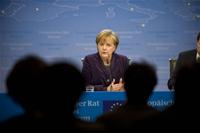 “Today we agreed that such a pact will come into existence. As far as the content is concerned, decisions on the content will be taken at the informal Euro group meeting and than by the Council meeting on 24 25 march consultations will take place to make sure whether other non euro area member states will be willing to join in or participate.” Ms Merkel used the formula 17+, which reflects this possibility. Although she denied that she had submitted to the Council a list of measures to be adopted, Merkel acknowledged that she had given certain examples.
“Today we agreed that such a pact will come into existence. As far as the content is concerned, decisions on the content will be taken at the informal Euro group meeting and than by the Council meeting on 24 25 march consultations will take place to make sure whether other non euro area member states will be willing to join in or participate.” Ms Merkel used the formula 17+, which reflects this possibility. Although she denied that she had submitted to the Council a list of measures to be adopted, Merkel acknowledged that she had given certain examples.
According to media reports, there are 6 points, which must be fulfilled by member states in 12 months: to abolish wage indexation to inflation, to ensure mutual recognition of diplomas and professional qualifications, to establish a common basis for corporate taxation, to link pension schemes to demographic development, to introduce constitutionally-bound debt brakes and to establish national frameworks for crisis management in the banking sector.
And something more interesting: France and Germany offer “the yardstick or the benchmark should be the member state that shows the best practice”. This is a serious difference compared to the Commission's proposal, which provides for the assessment of competitiveness to be made according to indicators set by the Commission for each Member State.
Media reported that some leaders argued strongly against the Franco-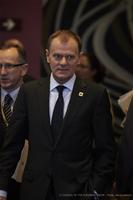 German proposals. They said Polish Prime Minister Donald Tusk had protested against the separation of the euro area from the other 10 EU countries, arguing that decisions should apply to all. Belgian Prime Minister Yves Leterme had strongly objected to the proposal to abolish wage indexation, which was practiced in Belgium.
German proposals. They said Polish Prime Minister Donald Tusk had protested against the separation of the euro area from the other 10 EU countries, arguing that decisions should apply to all. Belgian Prime Minister Yves Leterme had strongly objected to the proposal to abolish wage indexation, which was practiced in Belgium.
Besides the question of what support will the Pact receive, there is one more big uncertainty for the time being: how to ensure compliance with the agreement. Judging by the preliminary comments, it will be bound to the rescue fund for the euro area and its assistance (all the work “on the strengthening of the EFSF so as to ensure the necessary effectiveness” and the preparation of the permanent Stability Mechanism will be carried out by the Eurogroup). But if this is a solid argument concerning Ireland, Greece and Portugal, it is interesting how support will be won from countries that are not expected to resort to the fund. And whether, ultimately, the intergovernmental agreement will provide for sanctions in the spirit of the Deauville declaration.
As could be expected, the first reactions of MEPs were strongly critical. The substitution of the Community approach (at a European level and with the participation of European institutions) with the intergovernmental one has always been a controversial point between the Parliament and the Member States. This criticism is present in the statement of the President of the EPP Group, Joseph Daul, although his party itself welcomed the extraordinary summit of the eurozone.
The Leader of the ALDE Group, Guy Verhofstadt, however, was merciless: “…The sidelining of the European Commission is unacceptable. The Commission has the competence and expertise - but crucially it articulates the Union's interest. Neither the European Council - nor its President - can do this.” According to him, “discipline will only be effectively ensured through the application of the Community method and through the empowerment of the Commission.”
Greens/EFA co-president Rebecca Harms determined the proposed pact as “an intergovernmental mish-mash in which the European interest and the EU institutions are sidelined.” According to her, the pact does not reflect the full spectrum of economic imbalances in the euro area and put the blame only on the weaker member states. “It ignores crucial imbalances, such as Germany's low-wage policy and its surplus, which also damage the Eurozone.”
According to Ivaylo Kalfin of the Progressive Alliance of Socialists and Democrats Group, "the more there are mechanisms in the EU, in which we do not participate - be it the Schengen area or the euro area, the more Bulgarian citizens are becoming a second hand Europeans.”
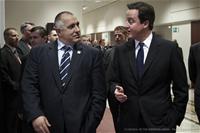 At this stage this is the only Bulgarian comment on the topic. After the European Council, Prime Minister Boyko Borissov was neither asked, nor he himself spoke about it, at least according to the official press releases and media reports. And before you say, what does the position of some Bulgaria matter – it does. For Bulgaria. Bulgaria must share its vision about Europe's future in order to take part in it.
At this stage this is the only Bulgarian comment on the topic. After the European Council, Prime Minister Boyko Borissov was neither asked, nor he himself spoke about it, at least according to the official press releases and media reports. And before you say, what does the position of some Bulgaria matter – it does. For Bulgaria. Bulgaria must share its vision about Europe's future in order to take part in it.
 | © euinside
| © euinside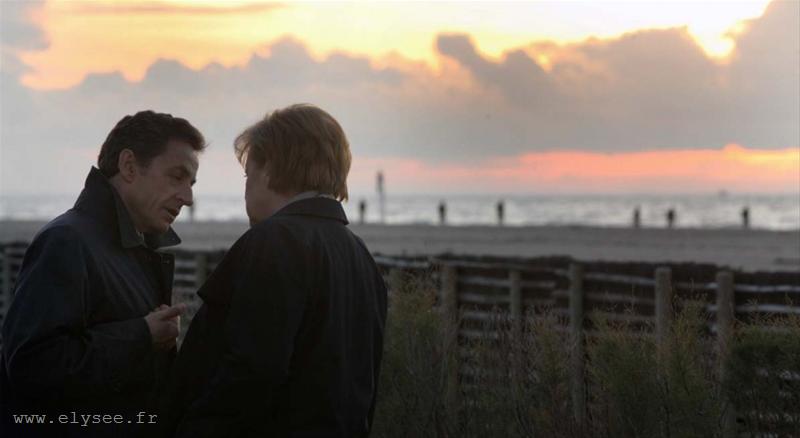 | © www.elysee.fr
| © www.elysee.fr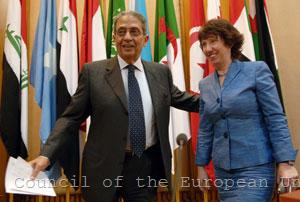 | © Council of the European Union
| © Council of the European Union